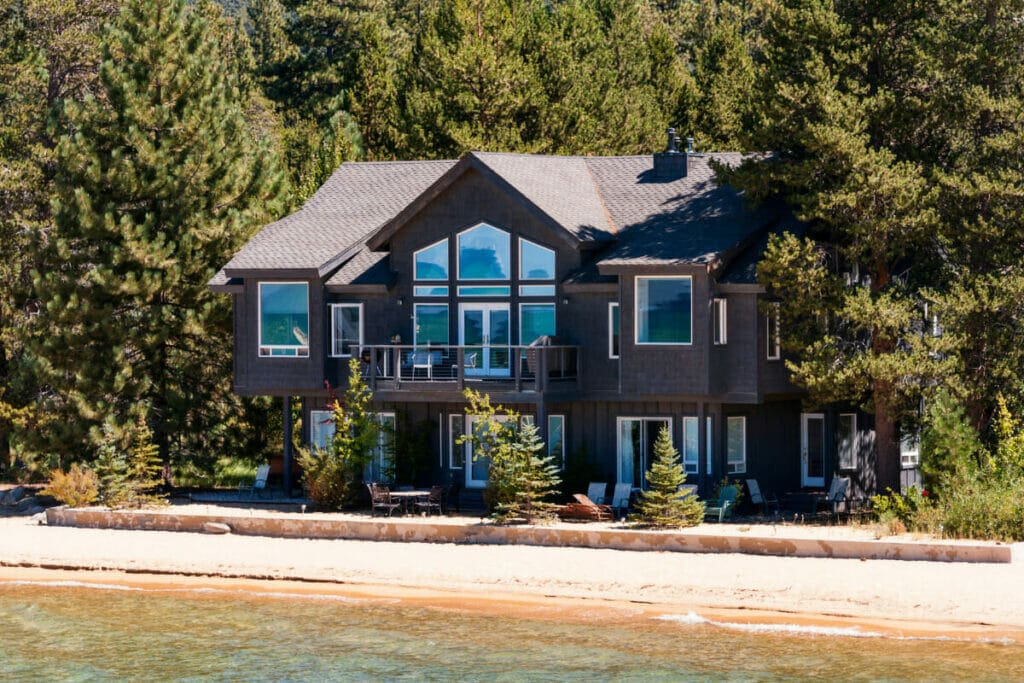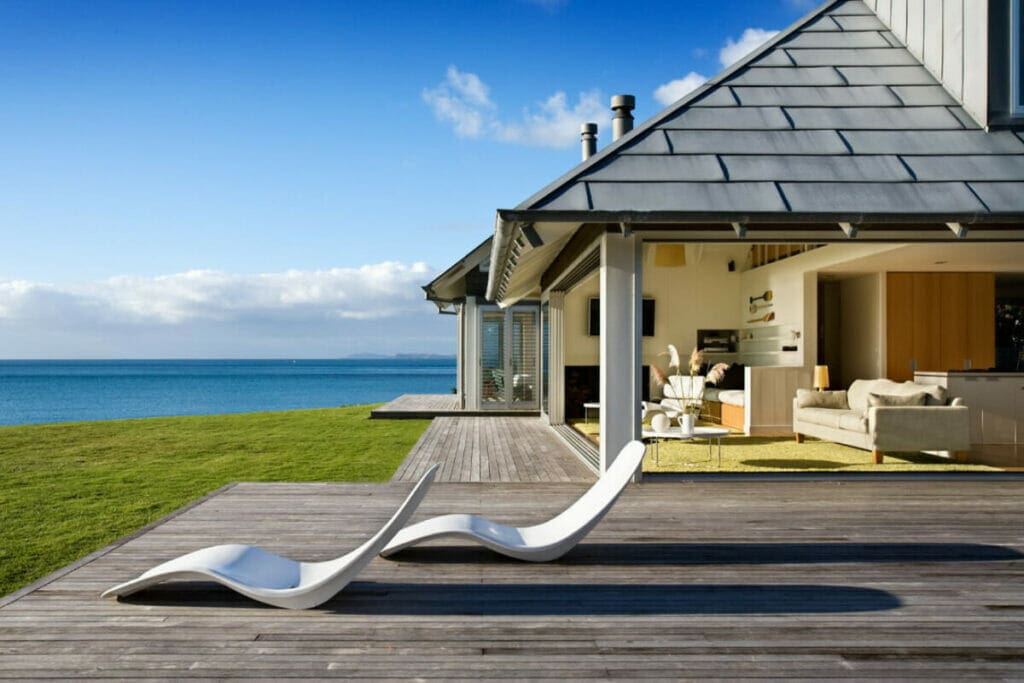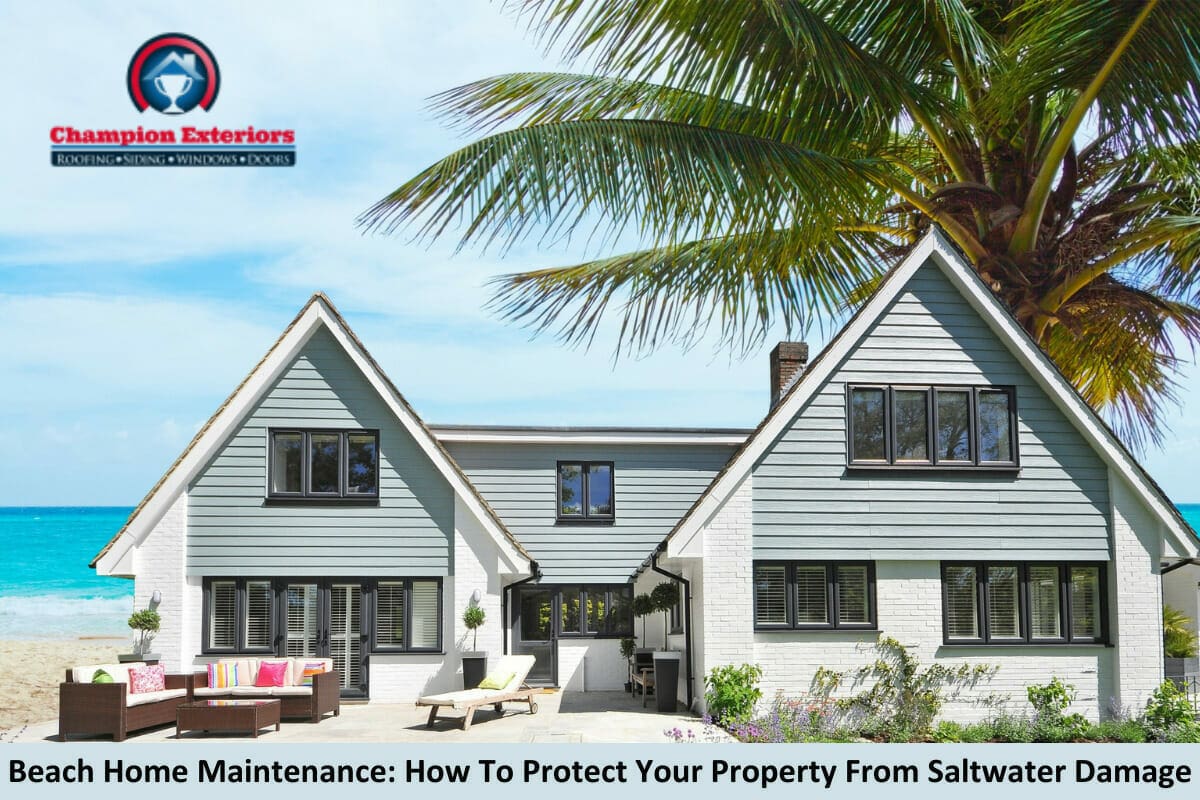Living near the beach comes with the risk of saltwater damage to your property. It also means that your home will require more protection and maintenance compared to homes located further inland. Moreover, if you don’t inspect the materials inside and outside of your beach home regularly, they can get damaged over time due to direct contact with salt water.
If you plan to clean and maintain your beach home, this blog post will help. We have listed several coastal home maintenance tips and tricks to make the task hassle-free.
Understanding Saltwater Damage
Before cleaning and maintaining your beach home, you must understand saltwater damage.
A. Sources of Saltwater Damage
If you reside in a coastal area, you may have observed unexpected damage, mold growth, and rust formation on metals, sidings, and even on the interior of your home. As a result of these disruptions, you may have been prompted to investigate their origins.
The sources of saltwater that damage a home or business near a beach include ocean spray, humidity, and rainwater. The saltwater carried by the wind, or by ocean spray, can settle on metal and other roofing materials, leading them to deteriorate and corrode. Moreover, this saltwater, combined with humidity and rainwater, can accelerate the corrosion process which will eventually deteriorate your home’s roofing materials, exteriors, and metals.
B. Common Materials And Areas Prone To Saltwater Damage
Some materials and areas are more susceptible to saltwater damage than others. Metals and alloys, for instance, are especially prone to corrosion and rust, while concrete and masonry can crack and deteriorate when exposed to saltwater. Wood and lumber are also at risk of warp and decay over time due to saltwater exposure. Roofs, gutters, windows, and doors are other areas that may suffer damage from saltwater, resulting in difficulties opening and closing due to corrosion and swelling.
Read our extensive blog post on 6 beach house trends to consider in 2023.
Signs of Saltwater Damage
Some elements of your home exterior or interior can show signs of damage, which you must address promptly. Leaving them untreated will only increase the repair and replacement cost. Here are some signs to look for when cleaning beach homes.
A. Home Exterior Signs
- Corroding metal surfaces: Rust formation and corrosion are common problems in beach homes, caused by the reaction of salt water, humidity, and rainwater with metal surfaces. This corrosion and rust formation are just the initial stages of damage, which can eventually result in water leaks. Keep an eye out for rust on metal railings, window frames, and gutters, as they are particularly vulnerable.
- Cracks in concrete: As saltwater interacts with concrete, it causes it to weaken and crack, so inspect your concrete surfaces for signs of damage. In addition, shingles and tiles absorb salt water, leaving behind salt crystals that have formed on their surface, which cause these materials to crack and split.
- Fading or peeling paint: Salt water can cause paint to peel or fade, indicating damage to the exterior surface of your home.
B. Interior Signs:
- Dampness or musty odors: Salt water can seep into your home, causing a musty smell or dampness in the air.
- Warping or buckling of wooden floors and ceilings: Saltwater damage can cause wooden surfaces to warp, buckle or expand.
- Mold growth: Saltwater damage may create ideal conditions for mold growth, so check for any signs of mold in your home, including black or green spots on walls and ceilings.
Beach Home Exterior Maintenance Tips

Cleaning and maintaining your home from the outside is essential since it is continuously exposed to coastal weather. Here are some tips to follow for coastal home cleaning.
1. Regular Cleaning
Whether you occasionally visit your beach home or permanently live there, regularly cleaning your home’s exterior will prevent the accumulation of sand, salt water, dirt, and debris.
Regular home exterior cleaning will also ensure that the siding, windows, and doors are rust and corrosion free. Since rust, corrosion, and mold can degrade your home’s curb appeal, cleaning it regularly is necessary. Ensure your home’s exterior siding, roof, and doors are properly inspected, and clean everything with the right tools and techniques.
2. Apply Protective Coatings
It can feel daunting to remove rust, corrosion, debris, and mold from a beach home, especially when people generally only go there for peace and enjoyment. Knowing that rust and corrosion are decomposing your roofing materials and metals can disturb this peace even further, so it’s necessary to prevent it from happening as much as you can.
To stop rust and corrosion, apply protective coatings such as paint on your beach home to prevent the damaging impacts of salt water from harsh elements. It will also ensure that your home’s walls are protected when you aren’t there for regular maintenance.
3. Check for Signs of Wear and Tear
There’s no doubt that salt water can disturb your home’s curb appeal and make it prone to damage, so checking for wear and tear can help you maintain its aesthetic appeal. Since your home is surrounded by a coastal environment, its siding is more fragile and prone to damage. Therefore, regularly inspect your exterior and maintain the siding and other elements to extend its life.
4. Maintain Gutters and Downspouts
Gutters are an integral part of a roofing system as they drain the water flowing off the roof and direct it away from the building. If they are exposed to salt water in coastal areas, they can become more susceptible to corrosion and, as a result, can damage the roof. Therefore, if you own a property near a beach, you need to protect your gutters from saltwater damage.
5. Install Impact-Resistant Windows and Doors
Living near the coast exposes your home to moisture, humidity, and ocean spray, which can cause damage over time. In addition to these weather-related risks, coastal homes are also prone to strong winds and flying debris. As a preventive measure, it is advisable to install impact-resistant, or hurricane-resistant windows in your coastal home. These windows can withstand harsh weather conditions and minimize damage caused by the elements, thereby prolonging the life of your home. Furthermore, impact-resistant windows maintain their transparency even when subjected to salt water.
6. Trim Trees And Vegetation
Maintaining the trees and vegetation around a beach home is crucial for protecting its exterior. Overgrown plants can cause damage to the roof, siding, and foundation of a house, while invasive roots and branches can lead to blockages in pipes and water damage. In addition, during high winds or storms, falling branches or trees pose a serious risk to the property and the people inside. Therefore, it’s important for homeowners to regularly inspect the plants around their homes to prevent storm damage.
7. Protect Outdoor Furniture and Equipment
Ensure you cover your outdoor furniture when it’s not in use. Since wooden furniture is particularly vulnerable to salt water, wind, and sand, leaving it uncovered is not a good idea. Protect them either with plastic tarps or apply rust-resistant coatings during storms and hurricanes.
By taking proactive steps to protect outdoor furniture and equipment, homeowners can enjoy them for longer periods of time and save money in the long run.
Interior Beach Home Maintenance Tips
As the home interior can also store sand, dirt, and saltwater, regular cleaning is essential for the materials inside. Follow the following maintenance tips to clean and maintain your home interior.
1. Control Humidity
Coastal areas face significant challenges with high humidity levels. When a home is left closed for an extended period of time, humidity levels can increase indoors. Additionally, inadequate ventilation in a home or attic can cause humidity levels to become so high that roofing materials become damaged from the inside, reducing the lifespan of the roof deck. To mitigate these issues, owners of beach homes often use dehumidifiers and air conditioning units to regulate the humidity levels inside their homes.
2. Clean Regularly
Regular cleaning of beach homes is essential, as sand, debris, and saltwater can find their way into your home, leading to dirt build-up and damage to surfaces. Homeowners should frequently clean floors, walls, and surfaces using appropriate cleaning solutions and methods. This will not only keep the interior looking its best but also prevent mold and mildew growth.
3. Protect Floors And Furniture
The humidity level inside your home can also damage the furniture. Protecting floors and furniture is essential to maintain their appearance and prolong their lifespan. Using area rugs, mats, and furniture covers can help prevent scratches, stains, and other forms of damage.
In addition, moisture inside your home may cause dust and sand to stick to floors, which on removal leaves marks and stains, disturbing the overall appearance of your interior
4. Check For Signs Of Damage
Checking for signs of damage is crucial to addressing problems before they become severe. Homeowners should regularly inspect their beach homes for signs of water damage, mold growth, insect infestations, and more. Early detection can also help prevent costly repairs and ensure the safety of occupants.
5. Use Corrosion-Resistant Materials
Using corrosion-resistant materials is important for protecting coastal homes from harsh environments. Salt and moisture can cause corrosion and rust, leading to significant damage to the home’s structure and equipment. Homeowners should only use materials that are resistant to corrosion, such as stainless steel and treated lumber.
6. Store Items Properly
Store items properly to ensure their longevity and minimize the risk of damage from the harsh coastal environment. Outdoor equipment and furniture, in particular, should be stored indoors or in protected areas during storms and hurricanes. This will prevent them from being blown away or damaged by high winds or debris. Homeowners should also consider using weather-resistant storage containers to protect smaller items, such as cushions and beach toys, from moisture and salt.
7. Maintain HVAC Systems
HVAC stands for heating, ventilation, and air conditioning. It refers to the system that controls indoor air temperature, humidity, and air quality in a building or home. An HVAC system typically consists of a furnace or heating unit, an air conditioning unit, ductwork for distributing air throughout the building, and ventilation systems to maintain indoor air quality.
Maintaining HVAC systems is crucial to ensure indoor comfort and air quality in beach homes, where salt and sand can clog filters and ducts, leading to poor performance and potential damage to the system. Regular maintenance and cleaning of HVAC systems can prevent costly repairs and ensure optimal performance.

Repairing Saltwater Damage
If you notice damage needing prompt repair and replacement, you should consider the following steps.
1. Hire A Professional
When it comes to repairing or replacing damaged elements in your home, you should call a professional roofer or contractor to address the issue on the spot. A professional contractor will have the necessary experience and expertise to assess the damage accurately and provide effective beach home repair service.
2. Assess The Damage
Before making any repairs, it is crucial to assess the extent of the damage. This involves a thorough inspection of the affected areas to determine the cause of the damage and the extent of any structural or cosmetic damage.
3. Repair Or Replace Damaged Areas
Once the damaged materials have been removed, the damaged areas can be rebuilt or replaced. This may involve replacing damaged roofing materials, rebuilding damaged walls, or replacing damaged siding. It is important to use high-quality materials and ensure that the repairs are done properly to prevent further damage.
What We Can Do For You.
Whether you live in a coastal home year-round, or seasonally, regular cleaning and maintenance can be daunting and take up sufficient time. But with our roofing and home exterior services, you can have peace of mind. We offer a number of home exterior services and roofing services to home and business owners, including roof inspection, installation, and repair.
Plus, we offer residential and business owners the opportunity to join our Overhead Clean Club maintenance program, in order to make their life hassle-free. By joining our Overhead Clean Club, you can claim all the benefits required to maintain and prevent your home from any damage, and only for $14.95 per month.
With our OCC, you’ll benefit from:
- Priority service
- Reduced fees
- Annual inspections
- Annual gutter cleanings
For residents living along the New Jersey coast, our Overhead Clean Club is a proactive and remedial solution. Contact Champion Exteriors today to hire professional, experienced roofers for your home and business. Call us today at (609)-845-3576 for a free consultation.


